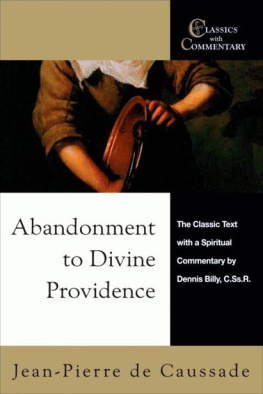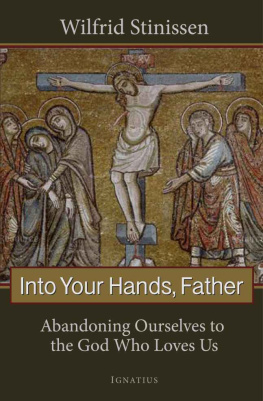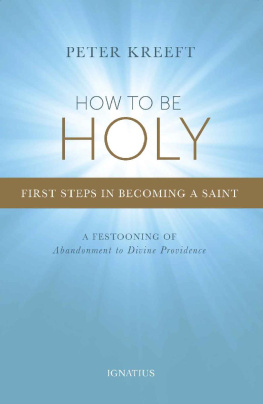Chapter I:
Sanctity Consists in Fidelity to the Order Established by God, and in Submission to All His Operations.

Section I. Hidden Operations of God.
Fidelity to the order established by God comprehended the whole sanctity of the righteous under the old law; even that of St. Joseph, and of Mary herself.

God continues to speak to-day as He spoke in former times to our fathers when there were no directors as at present, nor any regular method of direction. Then all spirituality was comprised in fidelity to the designs of God, for there was no regular system of guidance in the spiritual life to explain it in detail, nor so many instructions, precepts and examples as there are now. Doubtless our present difficulties render this necessary, but it was not so in the first ages when souls were more simple and straightforward. Then, for those who led a spiritual life, each moment brought some duty to be faithfully accomplished. Their whole attention was thus concentrated consecutively like a hand that marks the hours which, at each moment, traverses the space allotted to it. Their minds, incessantly animated by the impulsion of divine grace, turned imperceptibly to each new duty that presented itself by the permission of God at different hours of the day. Such were the hidden springs by which the conduct of Mary was actuated. Mary was the most simple of all creatures, and the most closely united to God. Her answer to the angel when she said: Fiat mihi secundum verbum tuum: contained all the mystic theology of her ancestors to whom everything was reduced, as it is now, to the purest, simplest submission of the soul to the will of God, under whatever form it presents itself. This beautiful and exalted state, which was the basis of the spiritual life of Mary, shines conspicuously in these simple words, Fiat mihi (Luke i, 38). Take notice that they are in complete harmony with those which Our Lord desires that we should have always on our lips and in our hearts: Fiat voluntas tua. It is true that what was required of Mary at this great moment, was for her very great glory, but the magnificence of this glory would have made no impression on her if she had not seen in it the fulfilment of the will of God. In all things was she ruled by the divine will. Were her occupations ordinary, or of an elevated nature, they were to her but the manifestation, sometimes obscure, sometimes clear, of the operations of the most High, in which she found alike subject matter for the glory of God. Her spirit, transported with joy, looked upon all that she had to do or to suffer at each moment as the gift of Him who fills with good things the hearts of those who hunger and thirst for Him alone, and have no desire for created things.

Section II. The Duties of Each Moment.
The duties of each moment are the shadows beneath which hides the divine operation.

The power of the most High shall over-shadow thee (Luke i, 35), said the angel to Mary. This shadow, beneath which is hidden the power of God for the purpose of bringing forth Jesus Christ in the soul, is the duty, the attraction, or the cross that is presented to us at each moment. These are, in fact, but shadows like those in the order of nature which, like a veil, cover sensible objects and hide them from us. Therefore in the moral and supernatural order the duties of each moment conceal, under the semblance of dark shadows, the truth of their divine character which alone should rivet the attention. It was in this light that Mary beheld them. Also these shadows diffused over her faculties, far from creating illusion, did but increase her faith in Him who is unchanging and unchangeable. The archangel may depart. He has delivered his message, and his moment has passed. Mary advances without ceasing, and is already far beyond him. The Holy Spirit, who comes to take possession of her under the shadow of the angels words, will never abandon her.
There are remarkably few extraordinary characteristics in the outward events of the life of the most holy Virgin, at least there are none recorded in holy Scripture. Her exterior life is represented as very ordinary and simple. She did and suffered the same things that anyone in a similar state of life might do or suffer. She goes to visit her cousin Elizabeth as her other relatives did. She took shelter in a stable in consequence of her poverty. She returned to Nazareth from whence she had been driven by the persecution of Herod, and lived there with Jesus and Joseph, supporting themselves by the work of their hands. It was in this way that the holy family gained their daily bread. But what a divine nourishment Mary and Joseph received from this daily bread for the strengthening of their faith! It is like a sacrament to sanctify all their moments. What treasures of grace lie concealed in these moments filled, apparently, by the most ordinary events. That which is visible might happen to anyone, but the invisible, discerned by faith, is no less than God operating very great things. O Bread of Angels! heavenly manna! pearl of the Gospel! Sacrament of the present moment! thou givest God under as lowy a form as the manger, the hay, or the straw. And to whom dost thou give Him? Esurientes implevit bonis (Luke i, 53). God reveals Himself to the humble under the most lowly forms, but the proud, attaching themselves entirely to that which is extrinsic, do not discover Him hidden beneath, and are sent empty away.

Section III. The Work of our Sanctification.
How much more easily sanctity appears when regarded from this point of view.

If the work of our sanctification presents, apparently, the most insurmountable difficulties, it is because we do not know how to form a just idea of it. In reality sanctity can be reduced to one single practice, fidelity to the duties appointed by God. Now this fidelity is equally within each ones power whether in its active practice, or passive exercise.
The active practice of fidelity consists in accomplishing the duties which devolve upon us whether imposed by the general laws of God and of the Church, or by the particular state that we may have embraced. Its passive exercise consists in the loving acceptance of all that God sends us at each moment.
Are either of these practices of sanctity above our strength? Certainly not the active fidelity, since the duties it imposes cease to be duties when we have no longer the power to fulfil them. If the state of your health does not permit you to go to Mass you are not obliged to go. The same rule holds good for all the precepts laid down; that is to say for all those which prescribe certain duties. Only those which forbid things evil in themselves are absolute, because it is never allowable to commit sin. Can there, then, be anything more reasonable? What excuse can be made? Yet this is all that God requires of the soul for the work of its sanctification. He exacts it from both high and low, from the strong and the weak, in a word from all, always and everywhere. It is true then that He requires on our part only simple and easy things since it is only necessary to employ this simple method to attain to an eminent degree of sanctity. If, over and above the Commandments, He shows us the counsels as a more perfect aim, He always takes care to suit the practice of them to our position and character. He bestows on us, as the principal sign of our vocation to follow them, the attractions of grace which make them easy. He never impels anyone beyond his strength, nor in any way beyond his aptitude. Again, what could be more just? All you who strive after perfection and who are tempted to discouragement at the remembrance of what you have read in the lives of the saints, and of what certain pious books prescribe; O you who are appalled by the terrible ideas of perfection that you have formed for yourselves; it is for your consolation that God has willed me to write this. Learn that of which you seem to be ignorant. This God of all goodness has made those things easy which are common and necessary in the order of nature, such as breathing, eating, and sleeping. No less necessary in the supernatural order are love and fidelity, therefore it must needs be that the difficulty of acquiring them is by no means so great as is generally represented. Review your life. Is it not composed of innumerable actions of very little importance? Well, God is quite satisfied with these. They are the share that the soul must take in the work of its perfection. This is so clearly explained in Holy Scripture that there can be no doubt about it: Fear God and keep the commandments, this is the whole duty of man (Ecclesiastes xii, 13), that is to saythis is all that is required on the part of man, and it is in this that active fidelity consists. If man fulfils his part God will do the rest. Grace being bestowed only on this condition the marvels it effects are beyond the comprehension of man. For neither ear has heard nor eye seen, nor has it entered the mind what things God has planned in His omniscience, determined in His will, and carried out by His power in the souls given up entirely to Him. The passive part of sanctity is still more easy since it only consists in accepting that which we very often have no power to prevent, and in suffering lovingly, that is to say with sweetness and consolation, those things that too often cause weariness and disgust. Once more I repeat, in this consists sanctity. This is the grain of mustard seed which is the smallest of all the seeds, the fruits of which can neither be recognised nor gathered. It is the drachma of the Gospel, the treasure that none discover because they suppose it to be too far away to be sought. Do not ask me how this treasure can be found. It is no secret. The treasure is everywhere, it is offered to us at all times and wherever we may be. All creatures, both friends and enemies pour it out with prodigality, and it flows like a fountain through every faculty of body and soul even to the very centre of our hearts. If we open our mouths they will be filled. The divine activity permeates the whole universe, it pervades every creature; wherever they are it is there; it goes before them, with them, and it follows them; all they have to do is to let the waves bear them on.













